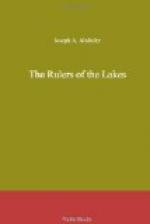Robert’s brilliant and enthusiastic mood lasted. He could see nothing but success. With the fading of the great slaughter by the river came other pictures, deep of hue, intense and charged with pleasant memories. Life recently had been a great panorama to him, bright and full of changes. He could not keep from contrasting his present position, hid in a thicket to save himself from cruel savages, with those vivid days at Quebec, his gorgeous period in New York, and the gay time with sporting youth in the cozy little capital of Williamsburg.
But the contrast, so far from making him unhappy, merely expanded his spirit. He rejoiced in the pleasures that he had known and adapted himself to present conditions. Always influenced greatly by what lay just around him, he considered their thicket the best thicket in which he had ever been hidden. The leaves of last year, drifted into little heaps on which they lay, were uncommonly large and soft. The light breeze rustling the boughs over his head whispered only of peace and ease, and the two comrades, who lay on either side of him, were the finest comrades any lad ever had.
“Tayoga,” he asked, and his voice was sincerely earnest, “can you see on his star Tododaho, the founder and protector of the great league of the Hodenosaunee?”
The young Onondaga, his face mystic and reverential, gazed toward the west where a star of great size and beauty quivered and blazed.
“I behold him,” he replied. “His face is turned toward us, and the wise serpents lie, coil on coil, in his hair. There are wreaths of vapor about his eyes, but I can see them shining through, shining with kindness, as the mighty chief, who went away four hundred years ago, watches over us. His eyes say that so long as our deeds are just, so long as we walk in the path that Manitou wishes, we shall be victorious. Now a cloud passes before the star, and I cannot see the face of Tododaho, but he has spoken, and it will be well for us to remember his words.”
He sank back on his blanket and closed his eyes as if he, too, in thought, had shot through space to some great star. Robert and Willet were silent, sharing perhaps in his emotion. The religion and beliefs of the Indian were real and vital to them, and if Tododaho promised success to Tayoga then the promise would be fulfilled.
“I think, Robert,” said Willet, “that you’d better keep the first watch. Wake me a little while before midnight, and I’ll take the second.”
“Good enough,” said Robert. “I think I can hear any footfall Tandakora may make, if he approaches.”
“It is not enough to hear the footfall of the Ojibway,” said Tayoga, opening his eyes and sitting up. “To be a great sentinel and forester worthy to be compared with the greatest, Dagaeoga must hear the whisper of the grass as it bends under the lightest wind, he must hear the sound made by the little leaf as it falls, he must hear the ripple in the brook that is flowing a hundred yards from us, and he must hear the wild flowers talking together in the night. Only then can Dagaeoga call himself a sentinel fit to watch over two such sleeping foresters as the Great Bear and myself.”




